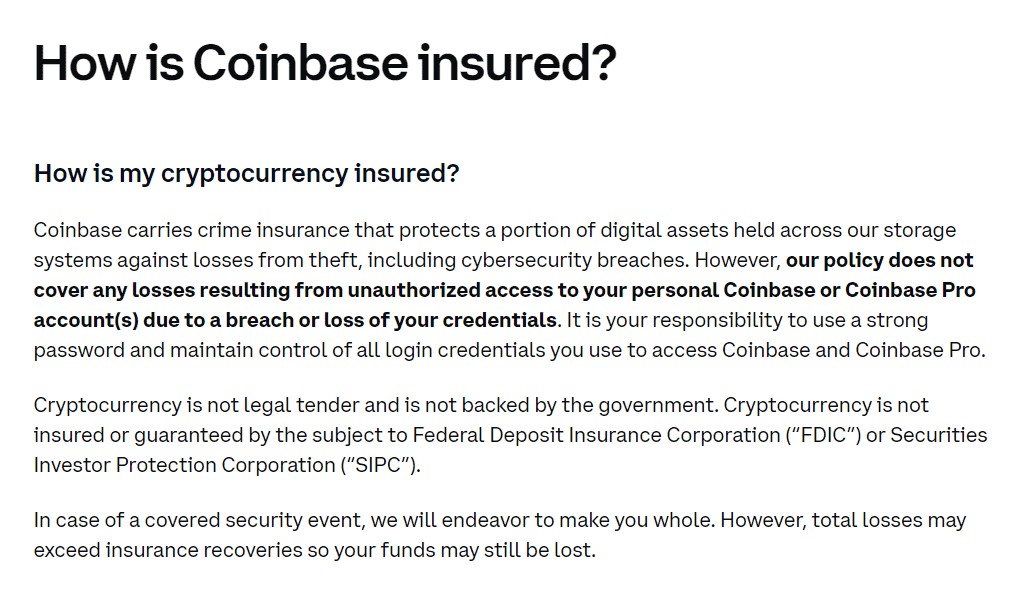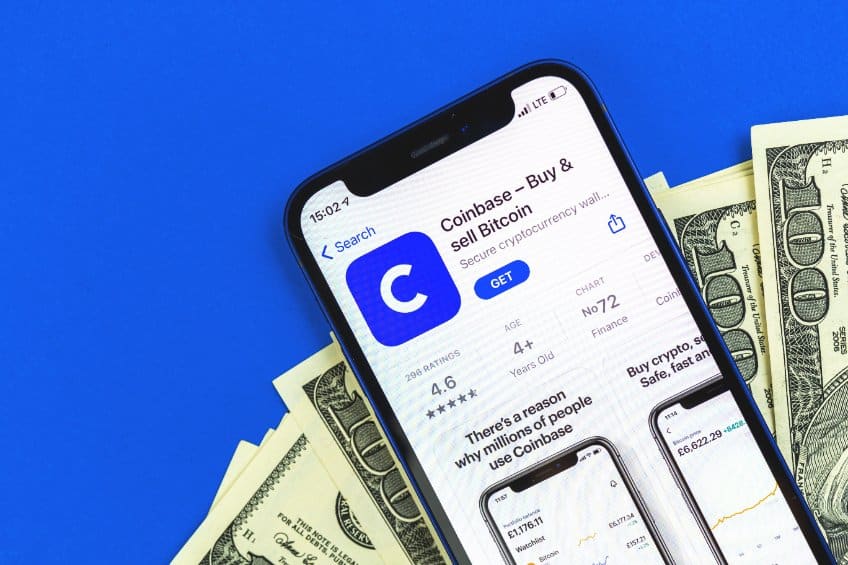Coinbase is a popular cryptocurrency exchange that allows users to buy and sell Bitcoin, Ethereum and other cryptocurrencies. But is Coinbase FDIC insured? In this blog post, we’ll explore whether or not Coinbase is FDIC insured and what that means for investors.
So, Is Coinbase FDIC insured?
No, Coinbase is largely NOT FDIC Insured. Coinbase is not a bank and is therefore not part of the FDIC deposit insurance program.
Why is Coinbase Not FDIC Insured?
Coinbase is not a bank, and is not insured by the FDIC. Instead, Coinbase is a digital asset exchange company that offers a platform for trading cryptocurrencies. Unlike a bank, Coinbase is not regulated by the US government and therefore is not subject to the same government protections that banks are.
While not directly saying so, Coinbase essentially admits this on their website:

Source: Coinbase.com.
While Coinbase is not FDIC insured, this isn’t a hard and fast rule. Coinbase does offers its customers some protection against hacking and theft through its coinbase Vault service. In addition, if you are a US account holder and your funds are held in cash by Coinbase you may have some protection. This is because Coinbase holds their US account holders dollar denominated funds in US banks which are protected from bank failure.

Source: Coinbase.com.
This does not include any cryptocurrency holdings you may have with Coinbase – the policy applies to dollars only. You should always take care to protect your account information and passwords. In short, while Coinbase offers some protections for your funds, it is not FDIC insured like a bank would be, and you should always take care to safeguard your own finances.
Will Coinbase Go Bankrupt?
Nobody knows for certain. Coinbase reported a loss of $430 Million in quarter 1 of 2022 (here). However, the company has significant name brand recognition and it’s currently a highly popular way to buy and sell Bitcoin. That said, Coinbase has faced some challenges in recent months. The price of Bitcoin has dropped sharply, and the company has been forced to lay off some employees. Additionally, some users have complained about delays in processing withdrawals. However, Coinbase remains a strong force in the world of cryptocurrency, and it’s unlikely to disappear anytime soon.
Readers should be aware that in the event of a Coinbase bankruptcy, account holders are likely to be treated as unsecured creditors (here). This means that account holders would be last in line to recoup any lost assets. In other words, Coinbase account holders could be out some or all of their cryptocurrency holdings in the event of a bankruptcy.
What Is The FDIC?
The Federal Deposit Insurance Corporation (FDIC) is a federal agency that insures deposits in banks and savings associations. FDIC deposit insurance protects the funds you deposit in a FDIC-insured bank or savings association up to $250,000 per depositor, per insured bank, for each account ownership category. The standard insurance amount is $250,000 per depositor, per insured bank. Deposits in different ownership categories are separately insured up to at least $250,000 at an insured bank. Insurance coverage limit applies to all depositors at an insured bank including joint accounts and certain retirement accounts.
The FDIC also examines and supervises certain financial institutions for safety and soundness and consumer protection. The Federal Deposit Insurance Corporation (FDIC) was created by the Banking Act of 1933. The 1934 Banking Act raised the federal deposit insurance limit from $5,000 to $10,000. In 1962, the federal deposit insurance limit was increased from $10,000 to $20,000. The federal deposit insurance coverage limit has been increased several times since then and stands at $250,000 since 2008.
For More Great MoreThanFinances articles, read these:
How To Make Money With An Ethereum Node
MTF Ratcoin Price Prediction – Going To Zero
MTF’s Hordcoin Rating – A Mixed Investing Proposition

James Hendrickson is an internet entrepreneur, blogging junky, hunter and personal finance geek. When he’s not lurking in coffee shops in Portland, Oregon, you’ll find him in the Pacific Northwest’s great outdoors. James has a masters degree in Sociology from the University of Maryland at College Park and a Bachelors degree on Sociology from Earlham College. He loves individual stocks, crypto investing, bonds and precious metals.

